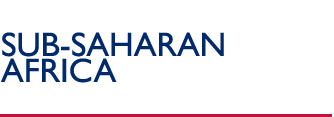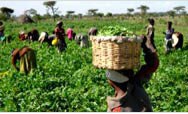Senegal
USAID's Strategy in Senegal
Senegal has progressed significantly in the past decade both
politically and economically. This progress has led to the country
achieving eligibility status for the Millennium Challenge Account,
due primarily to its strong commitment to ruling justly, investing
in people, and promoting economic freedom. A democratic, predominantly
Muslim but secular country, Senegal is a moderating voice in
the Islamic and African worlds. USAID assists Senegal to enhance
the productivity of its people and, in so doing, create jobs
for unemployed youth, improve access to education and health
care and further institutionalize democracy.
IMPROVING ECONOMIC LIVELIHOODS
Nationwide, 50 percent of young people have no jobs. Senegal
urgently needs growth, jobs, and the capacity to produce and
manufacture goods rather than just trade them. USAID supports
efforts to strengthen private enterprise development by promoting
national policies that encourage growth through enhanced collaboration
with the private sector. USAID also increases access to loans
for small entrepreneurs while providing them with the advice
and support they need for each step as they expand their businesses.
Over 21,000 female entrepreneurs benefited from loans through
USAID-support microfinance institutions. Over 1,000 people paid
for training in business management and income generating skills.
USAID also helps farmers develop natural products such as banana,
cashew, gum arabic, and hibiscus.
IMPROVING MIDDLE SCHOOL EDUCATION
Over 50 percent of men and 70 percent of women over 15 years
old are illiterate. USAID is determined to ensure that the next
generations are much more literate, and better prepared for
the global marketplace. USAID seeks to improve the quality of
middle school education (the seventh to ninth grades of Senegal’s
basic education cycle) and make it more accessible, especially
for girls. This is done by constructing and expanding schools;
improving training for teachers and principals; involving local
communities in the management and financing of middle schools;
and providing school textbooks and learning materials. USAID
plans to distribute 250,000 textbooks to Senegal’s 6,000
elementary schools as part of the Presidential Africa Education
Initiative. By 2008, it is expected that middle school enrollment
will increase to 50 percent from 40 percent in 2003, especially
among girls.
IMPROVING HEALTH CARE
Childhood vaccination rates have increased to 70 percent and
HIV/AIDS prevalence is currently at 1.4 percent of the population.
However, the high estimated prevalence rate among registered
commercial sex workers (20.9 percent) and the rapid increase
among young pregnant women aged 15 to 24 (0.74 percent in 2002
to 1.26 percent in 2003) is worrying. USAID seeks to decrease
child and maternal mortality and limit the spread of HIV through
increased access to and use of quality health services. USAID
HIV/AIDS programs encourage abstinence, fidelity, and condom
use as appropriate, while supporting a full range of services
to treat sexually transmitted infections, prevent mother-to-child
transmission, and care for persons living with HIV/AIDS. A total
of 6,910 persons used voluntary counseling and testing services
in 2004, 72 percent more than in 2003. Children’s health
is improved through vaccinations, prevention, and treatment
of childhood illnesses. Providing the means for families to
better space pregnancies and improving the care women receive
during their pregnancy reduces the number of women who die from
pregnancy.
STRENGTHENING LOCAL GOVERNANCE
Senegal has a strong tradition of democracy at the national
level, but local governance is less well established. USAID’s
goal is to build effective local governments that provide quality
services to their citizens. The democracy and governance program
encourages local governments and community organizations to
use transparent financial management and investment planning
that increase public participation in decision-making and oversight
of local affairs. In 2004, approximately 57 percent of local
governments followed proper budget processes and executed planned
priority activities with their own resources or incentive funds
from USAID. In an environment where local governments receive
very little funding from the central government, locally generated
resources are critical to local governments' ability to provide
basic services. Seventy-three percent of local governments increased
locally collected revenue in 2004.
Back to Top ^
|


